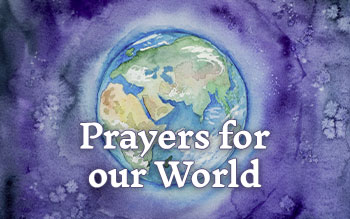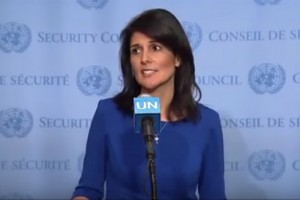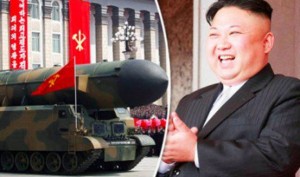Displaying items by tag: Iran
Nazanin update
Following last week’s PA article, ‘Foreign secretary’s blunder’, regarding Boris Johnson and Nazanin Zaghari-Ratcliffe’s imprisonment in Iran, continue to pray for this situation. Her husband Richard Ratcliffe has met Mr Johnson and hopes to travel with him to Iran; he said the ‘softly softly’ approach is not working. Pray for them to have a safe passage to Iran in the near future. It has been reported that Britain is preparing to pay a decades-old £450 million debt to Iran in a diplomatic effort at improving Nazanin’s chances of release. Pray that Mr Johnson can use fresh negotiation methods which will be acceptable to the Iranians. Pray for further anointing and wisdom for all the staff preparing for these negotiations. Pray for Richard Ratcliffe, and all assisting him, to have patience and peace and for God to hold Nazanin close to Him and heal her emotional, physical and spiritual wounds.
Iran, Iraq: earthquake aid
Israeli prime minister Benjamin Netanyahu offered humanitarian assistance, via the Red Cross, to the victims of a devastating 7.3 magnitude earthquake that killed hundreds in Iran and Iraq on 13 November. He was immediately refused. Netanyahu said Israel has no quarrel with the people of Iran; the quarrel is with the regime that threatens Israel’s destruction. Meanwhile tens of thousands of Iranians are living in the open, after homes built with earth were totally destroyed. The terrain is mountainous, and the temperature is dropping. The head of the Revolutionary Guards, Major General Jafari, said the immediate need was for tents, water and food. Pray for this crucial aid to reach the inaccessible areas as helicopters and army vehicles are mobilised. Pray for clear communication between agencies organising search and rescue operations and relief camps. Pray for those in hospitals, and those in mourning. See also
Yemen: civilians suffer from blockade
A Saudi-led coalition backing Yemen's government will not allow rebel-controlled air and sea ports to reopen until a better system is created to prevent weapons being smuggled from Iran. The coalition tightened its two-year blockade after a ballistic missile was fired at Riyadh airport. Iran denied arming Houthi rebels, and said the missile launch was ‘an independent action’ in response to coalition ‘aggression’. 2,000+ have died since April from cholera, and 3,500 cases are being treated daily. The blockade will undo efforts to curtail its spread. 27,000 children a month are treated for severe and acute malnutrition. With no aid deliveries, nutrition supplies will run out within two months, affecting the treatment of 400,000 children over the coming year. The children will bear the scars of this conflict long into the future. Civilians are the only people paying the price for political wrangling.
Foreign secretary’s blunder
Evin is a brutal and infamous prison. Dorothy Parvaz, who was held there in 2011, said detainees face daily cross-examinations, with constantly changing conditions in attempts to trick prisoners to admit to alleged crimes in a psychological battle. In May 2016 we reported on a campaign to free Nazanin Zaghari-Ratcliffe, a Christian British charity worker held in Evin prison. A petition was given to David Cameron to act on her behalf for early release. But she was given a five-year sentence for ‘attempting to topple the government’. Now, foreign secretary Boris Johnson has told the House of Commons that she was ‘teaching Iranians journalism’. It was an incorrect statement which could cause Iran to double her five-year sentence. Nazanin suffers depression from being separated from her husband and three-year-old daughter. Boris’s latest blunder has provoked an online petition accusing him of being unfit for the job, lacking attention to detail, a threat to British people, and damaging overseas relations. It calls for his resignation.
Iran: proposed changes in voting
Conservative MPs in Iran are proposing that Iranians should only be allowed to vote for members of their own religious group, making it impossible for members of religious minorities to be elected to any position of authority (90-95% of the population is Shia Muslim). Recently a Zoroastrian was suspended from the city council of Yazid, a historic city with many ancient Zoroastrian sites. The ruling clerics are becoming increasingly unpopular for taking harsher measures to block members of religious minorities from higher office. The proposal to force voters to vote for candidates from their own religious background would violate everyone’s democratic right to elect and be elected. Journalists, lawyers and some MPs have pointed to the presence of three Christians, a Jew and a Zoroastrian in Iran’s national parliament. The constitution currently allows each of the three minority groups a representative in parliament.
Iran: weapons-grade uranium warning
Ali Akbar Salehi, Iran’s nuclear programme chief, said on 29 October that Iran can begin producing weapons-grade nuclear material quickly if the nuclear deal with foreign powers fails, and insisted that international inspectors would not be given access to Iranian military sites. In early October President Trump told the world, ‘Iran is not in compliance with the deal, and it needs to be renegotiated even though our allies, and even our enemies, do not agree.’ Mr Trump said that the agreement had not curbed Iran’s missile programme and destabilising activities in the Middle East. Mr Salehi said that, although Tehran prefers to keep the agreement intact, they could quickly ramp up uranium enrichment to produce 20% enriched uranium in four days. He made these comments after meeting the director of the International Atomic Energy Agency, Yukiya Amano. Mr Amano also met President Rouhani and foreign minister Mohammad Javad Zarif. See
99. NSFA Update #51
NATIONAL SECURITY FOREIGN AFFAIRS UPDATE
OCTOBER 23, 2017 (REPORT #51)
Highlights:
- Cold War returns with nuclear-armed bombers on 24-hour alert
- CIA expands Taliban hunt
- ISIS battle converges in the Euphrates Valley
- Iraqi, Kurdish forces exchange fire at shared border
- U.S. Forces Korea ready with THAAD
- Russia complains U.S.-led coalition destroyed Raqqa like allies did the German city of Dresden in World War Two
- U.S. SEC State calls on Iran-backed militia to go home
- Iraq’s PM rejects Tillerson’s call for PMU to “go home”
CURRENT
- Cold War Returns with Nuclear-Armed Bombers on 24-hour alert. DefenseOne reports the U.S. Air Force is preparing to put nuclear-armed bombers on 24-hour ready alert, something not seen since the end of the Cold War. “This is yet one more step in ensuring that we’re prepared,” Gen. David Goldfein, Air Force chief of staff, said. “I look at it more as not planning for any specific event, but more for the reality of the global situation we find ourselves in and how we ensure we’re prepared going forward.” Putting the bomber fleet on alert is just one of many decisions facing the Air Force as the U.S. military responds to changing geopolitical environment that includes North Korea’s rapidly advancing nuclear arsenal as well as Russia’s increasingly potent and active armed forces.
- CIA expands Taliban hunt. The New York Times reports the CIA is expanding its operations in Afghanistan, sending teams alongside Afghan forces to hunt Taliban jihadi. The Times reports this is a shift for the CIA in that country, where it had focused on defeating al Qaeda and helping Afghan intelligence operatives. The agency’s paramilitary division, which is taking on the mission, numbers only in the hundreds and is deployed all over the world. The expanded mission reflects that agency’s assertive role under Mike Pompeo, the new director, to combat insurgents around the world. Pompeo said “We can’t perform our mission if we’re not aggressive. … This is unforgiving, relentless. You pick the word. Every minute, we have to be focused on crushing our enemies.”
- ISIS battle converges in the Euphrates Valley. The Air Force Times reports the coalition’s fight with ISIS jihadi is now focused along a stretch of the Euphrates River Valley straddling the Syrian border. ISIS no longer has a presence in cities such as Mosul, Tal Afar and Haditha. Rather, U.S.-led coalition forces are focused on driving ISIS out of towns like al Qaim. Air operations are “shaping” the battlefield by taking out weapons centers like car bomb factories and ISIS C3 centers. Brig. Gen. Andrew Croft, deputy commanding general for Air, Combined Joint Forces Land Component Command, Operation Inherent Resolve, said “They’ll move against multiple areas in the Euphrates River Valley in a multi-axis operation. The preponderance of ISIS forces, we believe, are in that area … essentially all the way out east to Rawa.”
CONSEQUENCES
- Iraqi, Kurdish forces exchange fire at shared border. The Military Times reports Iraqi federal and Kurdish forces exchanged fire at their shared border on Friday, ending a week of conflict whereby Kurds returned control to Iraqi forces. By mid-Friday, Iraq’s defense ministry said anti-terrorism forces used artillery against Kurdish forces in AltunKupri, a town in the Kurdish region. Kurdish forces withdrew last week in most areas to positions they last held in 2014, restoring the map to the time before the rise of ISIS.
- U.S. Forces Korea ready with THAAD. The Yonhap News Agency reports the U.S. Forces Korea set-up the unit charged with operating the advanced missile defense system deployed in that country. On Thursday, a ceremony was held in Seongju to transfer the Delta Battery of the 11th Air Defense Artillery brigade to the 35th ADA Brigade in South Korea. The Terminal High Altitude Area Defense (THAAD) battery, which has missile launchers, command and control facilities and a powerful radar, was first deployed in April, but at that time there were only two interceptor launchers. Four more launchers arrived last month.
- Russia complains U.S.-led coalition destroyed Raqqa like allies did the German city of Dresden in World War Two. The BBC reports the Syrian Democratic Forces, a U.S.-backed alliance of Kurds and Arabs, destroyed Raqqa, and Moscow compared that result to the Allied destruction of the German city of Dresden in WW II. Russia itself was accused of committing war crimes for bombarding Aleppo, Syria last year. UN war crimes investigators in June that there had been a “staggering loss of civilian life” in Raqqa. A Russian defense spokesman said “Raqqa has inherited the fate of Dresden in 1945, wiped off the face of the earth by Anglo-American bombardments.”
- U.S. SEC State calls on Iran-backed militia to go home. The BBC reports U.S. Secretary of State Rex Tillerson called on Iran-backed militias fighting ISIS should leave northern Iraq as the battle is nearing its end. Tillerson insists mopping up should be left to the Iraqis. Iraqi forces have been fighting ISIS alongside Popular Mobilization Units, a coalition of Shia militia, backed by Iran. Those units have been accused of abuses, including torture and killings, during the anti-ISIS operations in Iraq.
- Iraq’s PM rejects Tillerson’s call for PMU to “go home.”The media office of Iraqi Prime Minister Haider al-Abadi on Oct. 23 criticized U.S. Secretary of State Rex Tillerson's recent statements that Iranian-backed Popular Mobilization Units who helped Iraq fight the Islamic State should "go home," Reuters reported. According to Reuters, the prime minister's office said that "No party has the right to interfere in Iraqi matters."
Pray – lets be in prayer over each of these very significant situations and pray as we are guided.
Robert Maginnis
This email address is being protected from spambots. You need JavaScript enabled to view it.
Iranian Aggression Intensifies
UN ambassador Nikki Haley takes the "outlaw" regime to task.
October 20, 2017
Joseph Klein
Last July, Major General Mohammad Bagheri, the Iranian Revolutionary Guards (IRGC) military commander and chief of staff of Iran's armed forces, warned that "putting the Revolutionary Guard in the terrorist lists with terrorist groups can be very costly to the United States and its military bases and forces in the region." IRGC commander Mohammad Ali Jafari said on October 8th that "if the news is correct about the stupidity of the American government in considering the Revolutionary Guards a terrorist group, then the Revolutionary Guards will consider the American army to be like Islamic State all around the world." The next day the Iranian regime warned of a "crushing" response if the United States were to designate the IRGC as a terrorist organization. President Trump has called the Iranian regime's bluff with his announcement last week that he would do just that.
Designating the IRGC as a terrorist organization and imposing new sanctions for its aggressive actions in the region is not a restoration of the sanctions lifted by the Obama administration as part of its disastrous nuclear deal with Iran. If Iran insists it can do what it wants militarily in terms of missile launches, support of terrorist groups such as Hezbollah and Hamas, and arms transfers without violating the nuclear deal, then the United States can certainly act to curb such activities through financial pressure. The U.S. can impose sanctions against the Iranian regime's principal instrument for projecting aggressive, destabilizing force outside of its borders without violating the nuclear deal. The Iranian regime does not see it that way, however.
With the lifting of the nuclear-related sanctions making available billions of dollars to Iran's leaders to further finance the IRGC's exploits in Iraq, Syria, Lebanon, Yemen and elsewhere, the regime is furious that the Trump administration is tightening the financial screws again, even if for reasons not directly related to Iran's compliance with the terms of the nuclear deal. Thus, it is threatening U.S. forces and bases in the region. A couple of seemingly unrelated events this past week point to Iran's positioning itself for more aggressive military actions that could place U.S. forces in harm's way.
On Tuesday, Major General Bagheri landed in Damascus for talks with Syrian President Bashar Assad and senior Syrian officials, including the defense minister and the chief of staff of the Syrian armed forces. Bagheri is quoted as saying that his visit's purpose was to "put a joint strategy on continuing co-ordination and co-operation at the military level." Some experts on Iran believe that Bagheri's visit to Damascus at this time is intended to reinforce a message that Iran will continue to supply weaponry to Syria and to reinforce the presence of its terrorist proxy Hezbollah in Syria. This will not only serve to bolster the Assad regime, but it also will strengthen Iran's ability to follow through on its threats to the U.S. and its allies, principally Israel.
Meanwhile, following the departure of the Kurds from Kirkuk, Iraq earlier this week, the IRGC's operational Al Qods arm reportedly established a command center and five bases there. According to Debkafile, this constitutes "the first military facility Iran has ever established openly in Iraq." The Kirkuk region holds 45 percent of Iraqi's oil. The Iraqi branch of Iran's terrorist proxy Hezbollah has vowed that once ISIS is defeated it will start killing Americans, as it has done before.
It is against this backdrop that U.S. ambassador to the United Nations Nikki Haley used her entire speech to the UN Security Council on Wednesday to denounce the Iranian regime on multiple grounds. The session was supposed to be devoted to the Israeli-Palestinian conflict, but Ambassador Haley departed from the monthly ritual during which Israel is normally singled out for criticism by other Council members. She went after Iran instead. She explained why the Trump administration decided to take "a comprehensive approach to confronting the Iranian regime," which does not give the regime a get out of jail free card even if it is in technical compliance with the loophole-ridden nuclear deal agreed to by the Obama administration.
"We can't talk about stability in the Middle East without talking about Iran," Ambassador Haley said. "That's because nearly every threat to peace and security in the Middle East is connected to Iran's outlaw behavior. The United States has now embarked on a course that attempts to address all aspects of Iran's destructive conduct, not just one aspect. It's critical that the international community do the same. Judging Iran by the narrow confines of the nuclear deal misses the true nature of the threat. Iran must be judged in totality of its aggressive, destabilizing, and unlawful behavior. To do otherwise would be foolish."
Ambassador Haley accused the Iranian regime of continuing to "play" the Security Council. "Iran hides behind its assertion of technical compliance with the nuclear deal while it brazenly violates the other limits on its behavior. And we have allowed them to get away with it. This must stop."
Ambassador Haley proceeded to list various violations by the Iranian regime of Security Council resolutions pertaining to the transfer of conventional weapons from Iran and the arming of terrorist groups, including the Houthi rebels in Yemen and Hezbollah. She also pointed to what she called the Iranian regime's "most threatening act" – its launch of ballistic missiles capable of carrying nuclear weapons. "When a rogue regime starts down the path of ballistic missiles, it tells us that we will soon have another North Korea on our hands," Ambassador Haley said. "If it is wrong for North Korea to do this, why doesn't that same mentality apply to Iran? "
As for the Iran's supposed technical compliance with its commitments under the nuclear deal itself, known as the Joint Comprehensive Plan of Action (JCPOA), the UN's international inspectors are not able to visit Iran's military sites. Past work on nuclear explosive trigger devices appears to have taken place at one or more such sites in the past. International Atomic Energy Agency (IAEA) Director General Yukiya Amano admitted last month that when it comes to the IAEA's capacity to check whether Iran was conducting work on a nuclear explosive device, his agency's "tools are limited." The Iranian regime has also attempted to skirt the restrictions in the JCPOA on its procurement of materials, equipment, goods and technology related to Iran's nuclear activities. The Heritage Foundation noted in its recent report on the JCPOA, for example, that Iran was "caught red-handed trying to purchase nuclear technology and restricted ballistic missile technology from German companies."
U.S. intelligence had discovered North Korea's transfer of missile parts to Iran at the very same time that Iran was negotiating the nuclear deal, in clear violation of UN Security Council resolutions then in effect. The Obama administration chose to look the other way. Does anybody with a modicum of sense really believe that such collaboration between the two rogue nations is not going on today? Iran is flush with cash, thanks to the JCPOA. It wants to build out its missile and nuclear enrichment capabilities. In addition to covert transfers of materials and technology to Iran in violation of the nuclear deal, the JCPOA may provide a loophole for Iran to exploit in outsourcing some of the development work to North Korea for hard currency, which North Korea desperately needs. They are a perfect match for each other.
Proponents of the JCPOA argue that exiting the nuclear deal unless it is changed to the Trump administration's satisfaction would undermine U.S. credibility with North Korea and thereby kill any chance of negotiations to resolve the crisis caused by North Korea's continued testing of sophisticated nuclear arms and ballistic missiles. "If we want to talk to North Korea now, the possible end for the nuclear deal with Iran would jeopardize the credibility of such treaties," Reuters quoted German Foreign Minister Sigmar Gabriel as saying. Germany is one of the parties to the JCPOA. Other European allies have voiced similar concerns. So have Obama's former Secretaries of State Hillary Clinton and John Kerry.
This argument is absurd on its face. The whole point is to prevent Iran from becoming the next North Korea, not to kick the can down the road as usual. North Korea's aggressive pursuit of nuclear weapons and of intercontinental ballistic missiles equipped with nuclear warheads proves that weak agreements full of front-loaded goodies rewarding rogue regimes for elusive promises are worthless.
Iran: cyberattack on UK Parliament, nuclear deal
In June, Iran was responsible for a ‘brute force’ cyberattack on Parliament lasting over twelve hours. It was initially thought that Russia was behind the attack, but intelligence officials now conclude Iran was responsible. It was Tehran's first significant cyberattack on the UK. Hackers repeatedly probed ‘weak’ passwords of politicians and aides, forcing parliamentary officials to lock MPs out of their own email accounts as they scrambled to minimise the damage. The network affected is used by every MP, including the Prime Minister and her cabinet ministers. Nine thousand email accounts were affected. The revelations come after Britain, Germany, and France tried to keep the nuclear deal with Iran, agreed in 2015, on track after President Trump’s refusal to back it. Trump stopped short of ripping up the deal, but said that it would be terminated unless measures were taken to ‘toughen it up’. He believes the international community is being ‘naïve’ in its dealings with the regime.
Praying for International Security
“God is our refuge and strength, an ever-present help in trouble. Therefore we will not fear, though the earth give way and the mountains fall into the heart of the sea, though its waters roar and foam and the mountains quake with their surging.[c].. .Nations are in uproar, kingdoms fall; he lifts his voice, the earth melts…He makes wars cease to the ends of the earth. He breaks the bow and shatters the spear; he burns the shields[d] with fire… He says, “Be still, and know that I am God; I will be exalted among the nations, I will be exalted in the earth. The Lord Almighty is with us; the God of Jacob is our fortress.” (from Psalm 46)
Having witnessed with our facilitation teams the Lord bringing an end to eight wars and ethnic conflicts over the last 20 plus years when His people come together in united, focused prayer, I have full confidence that we could see Him do the same in the current, very scary stand-off with North Korea. We must, however, not lose our sense of intercessory concentration on this most urgent international security threat. God will use our united prayers even more than THAAD high altitude missile defense systems to raise up a shield of 24/7 protection, a virtual fortress so that we do not have to fear as the above psalm tells us. He can make this conflict subside and enable a peaceful solution to be reached if we will continue to cover it in ongoing intercession.
Here is the latest on this worsening crisis:
1) The problem with the military option
An article in the Washington Times today offers this perspective:
“The most detailed analysis of all possible scenarios ranging from a “crushing U.S. military strike to eliminate Pyongyang’s arsenals of mass destruction, take out its leadership, and destroy its military” to “removing chairman Kim Jong-Un and his inner circle, most likely by assassination,” is provided by Mark Bowden in The Atlantic. His conclusion: All these options not only will carry huge human and material costs, but their end results will turn both the regional and the global situation from bad to worse.
Gregory Treverton, the former chair of the U.S. National Intelligence Council, agrees that “military options against the North’s nuclear arsenal suffer from two problems: they might not succeed, and Pyongyang has devastating retaliatory options.” (Washington Times, Sept 29)
Let us pray that these violent military options will not have to be used. They could unleash a destructive retaliation that would cause the deaths of many hundreds of thousands if not millions of people.
2) The danger of provocative actions
“Japanese Defense Minister Itsunori Onodera warned Friday that North Korea may engage in dangerous provocations next month. The Japanese defense minister’s call for caution came after South Korean National Security Adviser Chung Eui-yong made a similar warning the day before.
There are several dates North Korea might choose to mark with its own special brand of fireworks. Oct. 9 is the anniversary of North Korea’s first nuclear test, Oct. 10 is the anniversary of the founding of the North Korean communist party, and Oct. 18 marks the start of the twice-in-a-decade Communist Party Congress in China.” (DailyCaller.com, Sept 29)
Pray that the North Korean regime will be held back from launching provocative operations due to Kim Jong Un’s fear of losing face with his own people or as part of these upcoming anniversaries.
3) China’s key role and the important use of sanctions
Successive rounds of U.N. sanctions have cut off more than 90 percent of North Korea’s publicly reported exports — including coal, iron ore, seafood and, most recently, textiles — and have restricted the regime’s ability to earn foreign currency income by sending workers abroad.
China accounts for roughly 85 percent of North Korea’s external trade and is seen by many as the key to forcing Pyongyang to at least freeze its nuclear and missile programs.” (Washington Post, Sept 29th)
“China and the United States have developed a closer relationship due to North Korea’s antics, which former U.S. Ambassador to China Max Baucus describes as genuinely disgusting and frustrating to Chinese President Xi Jinping.” (Breitbart, Sept 29)
China is absolutely the key factor for the peaceful resolution of this crisis. Pray that China and the USA will work closely together to solve this great international security problem. Pray that China will continue to effectively shut down their trade and business connections with North Korea and that any smuggling or bypassing of this new embargo will be strictly prevented so that the North Korean regime’s economic ability to wage war is choked off.
4) The perilous connection with Iran
“Failure to stop North Korea will almost certainly lead to a failure to stop Iran. In the past, Pyongyang has transferred nuclear and missile technology to Iran, resulting in similar missiles appearing in military parades in both capitals. Iran is now much more developed in science and technology, and is likely to improve on North Korean systems.
Furthermore, Iran can keep within all the restrictions imposed on it by the nuclear deal and still develop and test its nuclear weapon and missile program in North Korea.” (Algemeiner.com, Sept 29th)
Let’s pray that the relationship of North Korea and Iran will be cut off and that as North Korea is dealt with, Iran’s capacity to build up nuclear weapons and missile program will also be curtailed through similar sanctions and united actions by the international community.
Thanks for continuing to cover this alarming situation in your prayers.
John Robb, IPC Chairman









